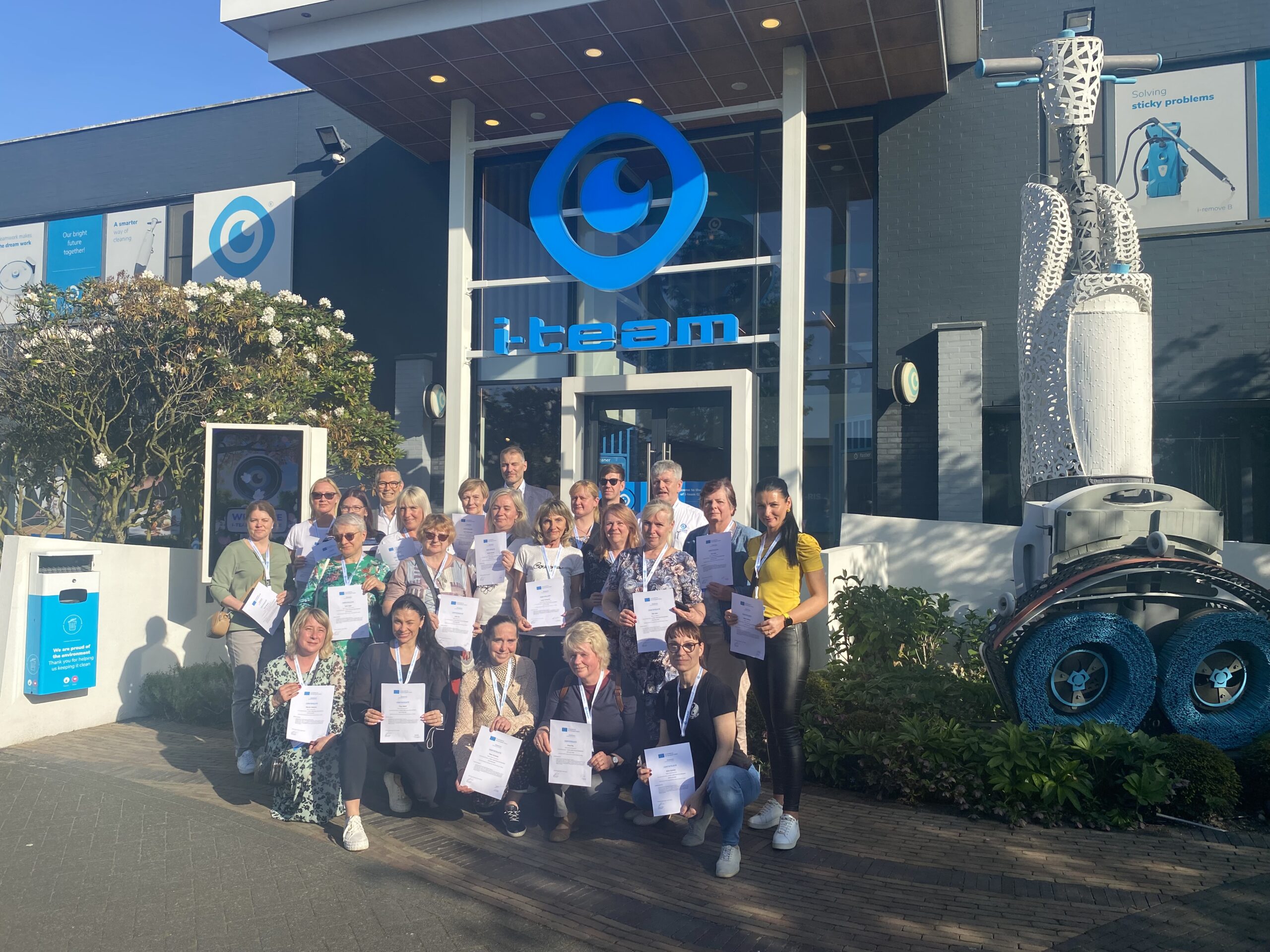info@puhastusekspert.ee +372 5611 1048
Learning Mobility to the Netherlands April 29 – 30, 2025
The learning mobility to the Netherlands on April 29–30, 2025, was an exciting and innovation-focused experience, centered around job shadowing at the headquarters of internationally renowned cleaning technology developer I-team Global in Eindhoven, affectionately known as the ‘Disneyland of Cleaning,’ and at NESO, the largest cleaning training center in the Netherlands, where job shadowing took place in practical learning environments.
Participants in the learning mobility included Järvamaa Vocational Education Centre, Eesti Liinirongid AS, Sol Baltics OÜ, P.Dussmann, Tartu Vocational College, Elva Hospital, Arkaadia Puhastus, Tartu Health Care College, Ida-Viru Central Hospital, and Pesuekspert. The learning mobility was supported by Erasmus+ consortium learning mobility project no. 2024-1-EE01-KA121-VET-000236654.
Participants in the learning mobility included Järvamaa Vocational Education Centre, Eesti Liinirongid AS, Sol Baltics OÜ, P.Dussmann, Tartu Vocational College, Elva Hospital, Arkaadia Puhastus, Tartu Health Care College, Ida-Viru Central Hospital, and Pesuekspert. The learning mobility was supported by Erasmus+ consortium learning mobility project no. 2024-1-EE01-KA121-VET-000236654.

What did we learn and how can we apply it in Estonia?
Job shadowing at I-team Global Headquarters – Inspiration for a New Level in the Cleaning Industry
I-team Global, located in Eindhoven, left an indelible impression on us. The company’s headquarters was built as a ‘Disneyland of Cleaning,’ a diverse environment where each room had a specific purpose and meaning. The future of cleaning was presented to us through innovation, practicality, and environmental sustainability.
The focus was on smart equipment and work methods, where a strong emphasis was placed on ease of use, ergonomics, and accelerating the work process. I-mop, I-fiber, I-link, and the brand new Icobot – each product is designed not to replace humans, but to support them in a smarter way. We particularly liked their motto, “robots don’t replace, they collaborate,” which also opens up a broad discussion in Estonia about the role of cleaning technology.
The focus was on smart equipment and work methods, where a strong emphasis was placed on ease of use, ergonomics, and accelerating the work process. I-mop, I-fiber, I-link, and the brand new Icobot – each product is designed not to replace humans, but to support them in a smarter way. We particularly liked their motto, “robots don’t replace, they collaborate,” which also opens up a broad discussion in Estonia about the role of cleaning technology.

Practical Experience at NESO Training Center
On the second day, we went for job shadowing at the NESO cleaning training center. NESO is the first and largest training center in the Netherlands specializing in cleaning professions. We were welcomed by Jeroen Aalbers, who provided a comprehensive overview of the training approach and facility structure.
At NESO, most of the learning takes place in a practical environment – teaching is done in small groups, and it is believed that making mistakes is part of learning. For example, in toilet cleaning training, 7 toilets are cleaned consecutively – in each subsequent one, mistakes made in the previous one are corrected. This approach could also be applied in Estonia to increase learners’ practical awareness and sense of responsibility.
We had the opportunity to job shadow in various typical rooms: a classroom, a hotel room, a hospital ward, a kindergarten, an office. Additionally, we gained hands-on experience in window cleaning and floor maintenance. We participated in a practical training session for Exentr machines, led by Wouter Joosse. Particularly thought-provoking was the fact that in the Netherlands, men predominantly work as cleaning service providers, contrary to Estonia, where cleaning service providers are mostly women.
At NESO, most of the learning takes place in a practical environment – teaching is done in small groups, and it is believed that making mistakes is part of learning. For example, in toilet cleaning training, 7 toilets are cleaned consecutively – in each subsequent one, mistakes made in the previous one are corrected. This approach could also be applied in Estonia to increase learners’ practical awareness and sense of responsibility.
We had the opportunity to job shadow in various typical rooms: a classroom, a hotel room, a hospital ward, a kindergarten, an office. Additionally, we gained hands-on experience in window cleaning and floor maintenance. We participated in a practical training session for Exentr machines, led by Wouter Joosse. Particularly thought-provoking was the fact that in the Netherlands, men predominantly work as cleaning service providers, contrary to Estonia, where cleaning service providers are mostly women.




What can we share in Estonia?
Õpiränne Hollandisse andis meile uusi vaatenurki ja praktilisi ideid, kuidas teadlik koristus ja inimesekeskne juhtimine saavad koos luua paremaid tulemusi. Oleme tänulikud võimaluse eest olla töövarjuks tipptegijate juures ning kasutame saadud teadmisi ja kogemusi Eesti koristusvaldkonna arendamiseks.
Artikli autor: Tiina Matsi
Artikli autor: Tiina Matsi